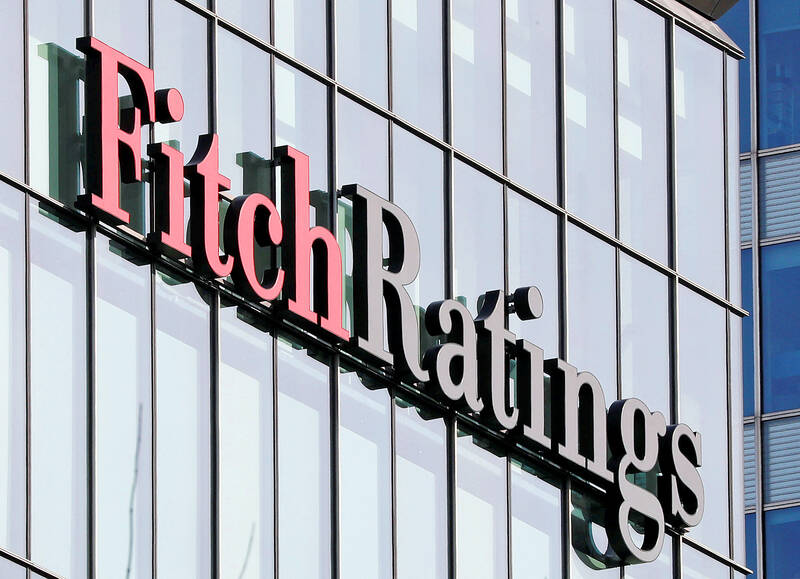Taiwan’s GDP would expand 3.2 percent this year, from 1.3 percent last year, Fitch Ratings said yesterday, posing a stable operating environment and business outlook for domestic banks.
“We expect the operation environment to be stable this year, supported by a recovery in external demand despite weak economic growth in the US and China, Taiwan’s top two trading partners,” Fitch credit analyst Cherry Huang (黃嬿如) said yesterday.
External demand is picking up thanks to an upturn in the technology cycle, the analyst said, adding that artificial intelligence applications are boosting exports and capital expenditure at semiconductor manufacturers.

Photo: Reuters
The central bank’s interest rate hike of 12.5 basis points in March would have limited impact on borrowers’ repayment ability, while low unemployment, improving GDP and moderate inflation should mitigate asset-quality deterioration despite a gradual unwinding of COVID-19-related loans, Fitch said.
The rate hike should also have limited impact on banks’ interest margins and loan quality, it said.
Fitch does not expect further policy rate hikes, as the central bank would keep interest rates at current levels for the rest of this year, the analyst said.
Rather, the agency is looking at a rate cut of 25 basis points next year to reverse the effect of monetary tightening this year and last year, Huang said.
Against that backdrop, Fitch assigned a “stable” outlook on Taiwan’s private banks on the expectation that their credit profiles would hold steady.
The rating suggests solid business and financial performance and manageable risk profiles, although lenders are likely to see a modest increase in impaired-loan ratios, from the unwinding of pandemic-related loans and offshore lending, analyst Sophia Chen (陳怡如) said.
Core profitability should hold steady this year, supported by consistent growth in lending and fee income and moderate credit costs, Chen said.
Most banks last year reported flat or improving profitability, with low credit costs and higher trading income.
The impact linked to international accounting rule changes on capitalization next year would be modest, and system liquidity would remain ample in local currency and US dollar terms, Chen said.
Ratings upside is also limited in the absence of major improvements in the banks’ franchises, profitability and capitalization, Chen said, adding that the scenario’s chance is dim, given Taiwan’s highly fragmented and competitive banking sector.
Taiwan banks’ credit profiles depend much on the resilience of their property assets in light of their high exposure to the real-estate sector, Fitch added.
Residential mortgage exposures climbed 7 percent over the past five years while commercial real-estate exposure grew 9 percent, helped by reshoring activity, despite unfavorable measures to cool the market, Fitch said.
“We expect regulators to remain vigilant about property loan concentration risks,” Fitch said, calling such risks “manageable” at present.

CHIP RACE: Three years of overbroad export controls drove foreign competitors to pursue their own AI chips, and ‘cost US taxpayers billions of dollars,’ Nvidia said China has figured out the US strategy for allowing it to buy Nvidia Corp’s H200s and is rejecting the artificial intelligence (AI) chip in favor of domestically developed semiconductors, White House AI adviser David Sacks said, citing news reports. US President Donald Trump on Monday said that he would allow shipments of Nvidia’s H200 chips to China, part of an administration effort backed by Sacks to challenge Chinese tech champions such as Huawei Technologies Co (華為) by bringing US competition to their home market. On Friday, Sacks signaled that he was uncertain about whether that approach would work. “They’re rejecting our chips,” Sacks

NATIONAL SECURITY: Intel’s testing of ACM tools despite US government control ‘highlights egregious gaps in US technology protection policies,’ a former official said Chipmaker Intel Corp has tested chipmaking tools this year from a toolmaker with deep roots in China and two overseas units that were targeted by US sanctions, according to two sources with direct knowledge of the matter. Intel, which fended off calls for its CEO’s resignation from US President Donald Trump in August over his alleged ties to China, got the tools from ACM Research Inc, a Fremont, California-based producer of chipmaking equipment. Two of ACM’s units, based in Shanghai and South Korea, were among a number of firms barred last year from receiving US technology over claims they have

BARRIERS: Gudeng’s chairman said it was unlikely that the US could replicate Taiwan’s science parks in Arizona, given its strict immigration policies and cultural differences Gudeng Precision Industrial Co (家登), which supplies wafer pods to the world’s major semiconductor firms, yesterday said it is in no rush to set up production in the US due to high costs. The company supplies its customers through a warehouse in Arizona jointly operated by TSS Holdings Ltd (德鑫控股), a joint holding of Gudeng and 17 Taiwanese firms in the semiconductor supply chain, including specialty plastic compounds producer Nytex Composites Co (耐特) and automated material handling system supplier Symtek Automation Asia Co (迅得). While the company has long been exploring the feasibility of setting up production in the US to address

OPTION: Uber said it could provide higher pay for batch trips, if incentives for batching is not removed entirely, as the latter would force it to pass on the costs to consumers Uber Technologies Inc yesterday warned that proposed restrictions on batching orders and minimum wages could prompt a NT$20 delivery fee increase in Taiwan, as lower efficiency would drive up costs. Uber CEO Dara Khosrowshahi made the remarks yesterday during his visit to Taiwan. He is on a multileg trip to the region, which includes stops in South Korea and Japan. His visit coincided the release last month of the Ministry of Labor’s draft bill on the delivery sector, which aims to safeguard delivery workers’ rights and improve their welfare. The ministry set the minimum pay for local food delivery drivers at